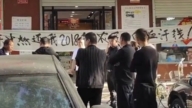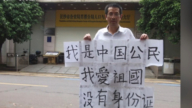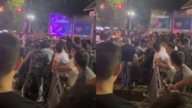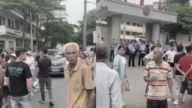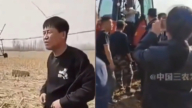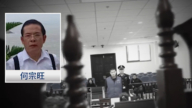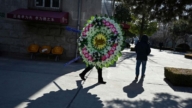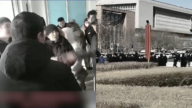【新唐人2011年10月29日讯】中国百姓到底有没有人权?“中国武警部队针对访民处理训练”的视频被泄漏之后,中国访民了解自己面对的是一个什么处境,那就是中共“将访民当敌人、敷衍后镇压”。有关人士认为,在中国,警察、武警部队早已是政府官员行使权利的工具,中国百姓没有人权可言。下面请看本台记者报导。
名为《武警部队参谋长集训演示科目》的视频,全场约27分钟,是一次内部集训用的演示片。讲的是武警部队参谋长模拟训练哨兵的工作要领。
要领包括:加强部署及对单个上访人员拦车的方式处置;以及如何对付群体性上访人员的情况处置。
“请问你在这有什么事情吗?有啊!我想找部长给我解决问题,上这边讲话。此时,领导乘坐车驶出大门,上访人员突然掏出横幅,冲向车辆。拦!警卫人员迅速夺下横幅,副哨协助控制上访人员……”
中国冤民大同盟总干事张兆林表示,警察、武警是政府官员行使权利的工具。
张兆林:“就是靠警察在治理这个国家,你看我们国家为什么到现在这个劳动教养还不取消呢,很简单的道理,就是一个警察、公安局就可以判你这个人,限制你这个人的自由,不是说10天、15天,甚至1年、2年、3年都可以的。就是我们国家把权力已经下放到警察那里了,都把权力下放了。就是说,这个很明显就是说我们国家的老百姓肯定是没有人权的,就是我们国家的人权状况不能好,就是这个道理。”
张兆林指出,政府不让老百姓的诉求得到应有的合法权益,老百姓肯定要抗议,要维权,那么政府就要动用警察,训练警察来镇压老百姓。所以,很多访民都被劳动教养,有的甚至关到精神病医院里面。
今年10月10号,长沙拆迁访民,因拆迁问题,不断上访,问题在没有得到解决的情况下,21位访民同时遭地方政府劳教,部分访民家属失去生活保障。
上海冤民邵满根:“他们这样利用高压手段来,就是要访民要怕他们,因为他们不让讲心里话,其实我们访民有好多心里话要讲的,都是实质的问题。但是他们就是要通过这样的事情,来要我们老百姓不要动政治,不要去反抗他们。要做一个顺民、良民。他们要想怎么样就怎么样。他们不是说一个人对付你一个人,他们有可能是株连九族的啦。”
邵满根指出,由于中共的历次运动,中国好多老百姓也怕,心有顾忌,面临着精神和生活的双重压力,致使好多问题不敢讲。邵满根形容,中国老百姓现在是无奈,而中共是无赖,中国目前正在走向悲哀的边缘。
10月15号,中共十七届六中全会在北京召开,全国各地大批访民陆续前往北京,希望能够向当局反映冤情。但是,当局派出大批警察,沿途设卡,对行人严加盘查,搜出上访材料,强行抓走。送往专门羁押访民的“久敬庄”。访民反映,当天至少有30辆装满访民的公交车开到“久敬庄”。
浙江民主人士邹巍:“在现实当中,(中共当局)动用包括是警察、武警对付老百姓呢,实际上已经不是新鲜的事情了。特别是动用对付老百姓上访。”
邹巍表示,武力是不应该用来对付老百姓的诉求的,中共不断的这样做了,最终会产生爆炸性的局面。但最后肯定是和平民主战胜暴力。
新唐人记者唐睿、郭敬采访报导。
Police Training on Dealing with Petitioners
Do Chinese people have human rights?
A video of China’s Armed Police Force Training
On How To Deal With Petitioners was
inadvertently leaked to the public,
which helped Chinese petitioners
understand what they are up against.
That is, the Chinese Communist Party (CCP)
treats petitioners as enemies, and represses them.
Chinese people believe that police and
armed forces have become the main tools used by govt. officials
to enforce the laws they enact,
and thus the Chinese people have no human rights at all.
The 27-minute video, China’s Armed Police Force Training
On How To Deal With Petitioners, is an internal training video.
in which the chief of the armed forces
demonstrates the essentials of guard training.
The essentials include: strengthening deployment,
methods of dealing with individual petitioners’ blocked cars,
and how to deal with groups of petitioners.
“Do you have any business to take care, here?”
“Yes! I’m looking for ministers to solve a problem for me.
I’ve come here to speak out.”
Leaders in the car didn’t ask to stopped them,
but petitioners suddenly took out a banner,
and rushed to the vehicle.
Stop that! Leaders said. Security personnel snatched the banner,
and deputy guard helps to control the petitioners.
Zhang Zhaolin, director of the Chinese Petitioners Alliance,
said the police and armed forces are power tools of the CCP.
Zhang Zhaolin: “The CCP relies on the police to
control the country.
Why doesn’t our country abolish forced labor camps?
It is very simple, police and public security bureau agents
can use the labor camps to sentence you and limit your freedom.
Not just for 10 days or 15 days, but maybe for 1 to 3 years.
In our country, the power has been given to the police.
It is obvious that our people have no human rights.
The human rights situation in our country is not good
and this is the reason.”
Zhang Zhaolin said the CCP regime won’t allow ordinary people
to have legitimate aspirations because if they were allowed,
people would definitely protest when their rights were violated.
However, the regime uses the police, and specially train police
to suppress the Chinese people.
Therefore, many petitioners were sent to forced labor camps,
and some were even sent to psychiatric hospitals.
On October 10, petitioner Changsha constantly petitioned
against unlawful demolitions by the state.
As a result, 21 petitioners were sentenced to forced labor camps
by the local government, without having their issues resolved.
and some petitioners’ family members could not make a living.
Shao Mangen, a Shanghai petitioner: “They exerted
a lot of pressure on the petitioners so that they would be afraid.
Petitioners are concerned about many critical issues but the CCP
warns people not to be involved in politics,
and not to resist the CCP, but instead be docile
and innocent civilians.
The CCP can do whatever it wants to do.
They not only punish you, but also your whole clan."
Shao Mangen pointed out that due to the CCP’s previous campaigns,
a lot of people are afraid, but they are clever, too.
They do not dare to speak out about the problems they are facing.
Shao described the Chinese people as “helpless.”
He described the CCP as a “rogue regime,” and said that China
is moving toward the edge of sorrow.
On October 15, the Sixth Plenary Session of the CCP
was held in Beijing where a large number of petitioners gathered,
hoping to make voice their grievances to the authorities.
However, the authorities sent a large number of police there,
set up checkpoints along the way,
and strictly questioned pedestrians.
If they found petition materials on anyone,
they would forcibly take them away
and send them to a special detention center in Jiujingzhuang.
At least 30 buses full of petitioners were sent there.
Zou Wei, a Zhejiang democrat: “In reality, Chinese authorities
use of police and armed police to deal with people,
is not a new thing, especially in regard to petitioners.”
Zou Wei said that force should not be used against people
who are voicing their demands, but the CCP continues to do so.
This will eventually produce an extremely volatile situation.
But in the end, peace and democracy will prevail over violence.
NTD reporters Tang Rui and Guo Jing


